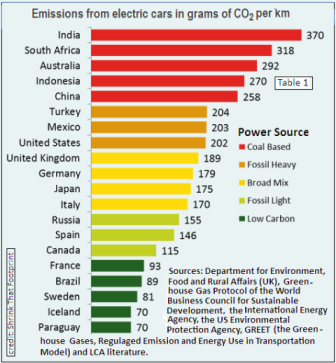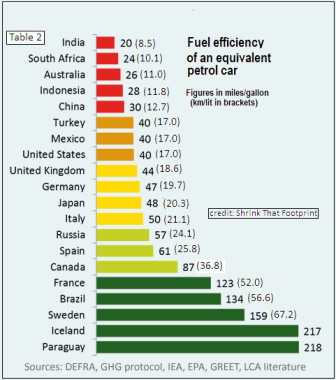How green is the electric car?
- India and the Electric Car
Is the electric car the right solution for India? asks S.Ananthanarayanan.
A variety of electric cars has entered the market in India – priced from Rs 80 lakh to less than a tenth of that price. Charging stations, where the cars can top up the batteries, are sprouting and the plan is to have one every four km in the larger cities.
The cars can also use domestic connections and the cost is said to be below Rs 2.00 per kilometer.
The trend in India follows that in most parts of the world, where the electric car is fast gaining ground. The sale in Jan 2020 is reported as over 1,50,000 cars and all major manufacturers are now in the field. The journal, Nature Sustainability, carries
a review to see if this is really good for the environment. Florian Knobloch, Steef V. Hanssen, Aileen Lam, Hector Pollitt, Pablo Salas, Unnada Chewpreecha, Mark A. J. Huijbregts?and Jean-Francois Mercure, from Radboud University, the Netherlands, University
of Cambridge, University of Exter and University of Macao, compare the ‘life-cycle greenhouse gas emissions’ of using electricity, or fossil fuels, to drive personal transport and household heating, worldwide.
The study covers 59 regions of the world, and they find that in 53 of these, which account for 95% of the global transport and heating demand, the use of electricity can better the use of fossil fuels in the net emissions of greenhouse gasses, even with
the existing methods of generating electricity. The troubling part of the finding is that among the six regions where this is not true, India figures as the leader!
The electric car has been actively encouraged and incentivized in India. The Department of Heavy Industry, Govt. of India, under the National Mission for Electric Mobility, has formulated a Scheme known as Faster Adoption and Manufacturing of (Hybrid &)
Electric Vehicles in India (FAME India) and the Power Ministry has issued guidelines for setting up charging facilities that are efficient and economical. Under the agies of FAME, in 2015, car rallies were flagged off in three cities in India, to promote ‘electrification
of automobile transportation’. When the event was planned to take place just a week before the International summit in Paris, to combat climate change, this newspaper (2nd Dec 2015) had carried a piece that questioned whether electric cars in India were in
fact economical for India
While the electric car emits no direct greenhouse gases, the electric car can be only as green as the electricity that it consumes. In most countries now, a good proportion of electricity is generated from hydroelectric, wind driven and nuclear sources
of energy. In India, however, and Australia and Indonesia are similar, most of the electricity is generated in power plants fired with coal, petroleum or natural gas, the bulk being coal. And the coal in India is notoriously poor, emitting more pollutants,
like SO2, in addition to CO2, for every calorie of heat, than better quality coal.
The review in 2015 had noted that while the use of the electric car was environment friendly when electricity came from non-polluting sources, the efficiency dropped when the sources were more dependent on fossil fuels. Comparisons made are shown in the
Tables 1 and 2. Table 1 shows that with heavy coal dependence, poor quality of coal, transmission losses, etc., the net emissions when electric cars are used in India were over twice the emissions in European countries, Canada and Japan, over one and half
times that in USA and even China. Table 2 displays this information in terms of the fuel efficiency of a petrol driven car, if it were to match the electric car. We can see that in the best cases, the electric car works like a petrol car that runs for over
17 km on a litre of petrol. The same electric cars in India, however, behave like petrol cars that use up a litre of petrol every 8.5 km. As many petrol cars do a lot better than that in India, it seemed that switching to electric cars would result in greater
GHG emission than reduction!


The current review in Nature Sustainability has addressed the same concern, to verify if the electric car is more environment friendly, considering the continuing presence of fossil fuels in generating electricity. With improved battery packs and the drop
in prices of electric cars, the electric car has become affordable. While the low running costs are because of the electricity tariff being what it is, it was important to know that the low tariff was not leading to greater emissions when petrol users shift
to electricity. While there is a relentless drive to ‘decarbonise’ electricity generation, is it premature, in India, to shift to electricity for transport?
[With falling use of the IC engine, world-wide, the cost of the conventional car would rise. Countries like India would then shift to EVs. But would that be good for planet earth? Should the 'rest of the world' not subsidise the IC engine in India (and
the like) for the common good? ]
------------------------------------------------------------------------------------------
Do respond to : response@simplescience.in
-------------------------------------------